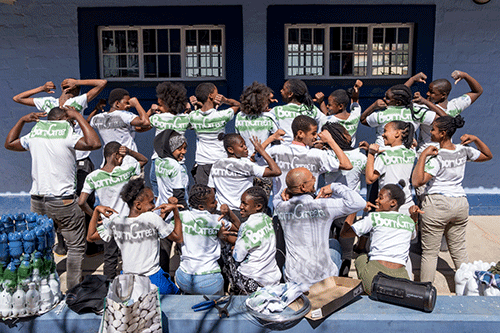Building towards a conserved natural environment, learners from different parts of Namibia gathered in Windhoek last month to showcase their projects on wildlife conservation.
Other projects include environmental awareness and ecological sustainability under the ‘Schools Go Green with Goethe’ project.
This pilot project, initiated by the Goethe-Institut Namibia, invited schools to work on their projects in February this year, which culminated in the exhibition of the inventive works on 17 September.
Participating schools received funding from the Goethe-Institut for their environmental club activities.
Irmi Röder of the Goethe-Institut Namibia said we live in a time and age where we need to step up efforts to save our planet from the disastrous effects of climate change and economic exploitation of the environment.
“It is best to plant seeds early, i.e., in schools, to raise awareness amongst young people for the plight of mother earth,” she noted.
In their pursuits, Wild Kids Academy produced a 32-page soft cover booklet titled ‘10 Trees of Zambezi Region’, listing endemic trees of northeastern Namibia. This publication aims to educate learners about the life cycle and anatomy of a tree and the need for trees while exploring the harmful effects of deforestation.
Windhoek Gymnasium’s senior primary school class environmental club fabricated a vertical hydroponic tower, complete with baby lettuce and tomato plants and its miniature 3D aquaponics model, consisting of a small aquarium with tiny fish. Their ‘Urban Farm’ showcased an accomplishment from dabbling in water-saving urban farming methods.
Windhoek International School created earthworks and planted succulents that aim to prevent soil erosion and transform areas at risk of further erosion.
Private School Swakopmund constructed a fog-catcher to contribute to an ongoing experiment to harvest water out of the humid air at the coast.
Pro-Ed Academy, also from Swakopmund, showcased an aesthetic view of crafts made during regular environmental days at its school, while Windhoek High School devised a manual can crusher to tackle solid waste management on its school grounds.
Rocky Crest High School from Windhoek presented hand-made firebricks from waste paper, and Etosha Secondary School from Tsumeb devised ways to combat solid waste issues in Rundu.
Assisting the schools’ environment clubs in the project were the ‘Tree Rangers’ who are young professionals under the tutelage of Donovan Wagner from the Eloolo Permaculture Initiative, a Namibian non-profit organisation engaging in environmental awareness and activism.


